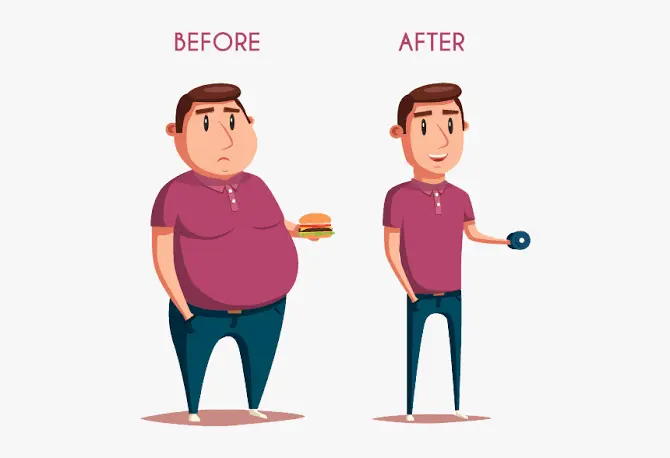
Introduction
Achieving fast weight loss often seems like a daunting challenge, especially when you’re seeking results quickly. Whether it’s for an upcoming event or a personal goal, shedding pounds in a short amount of time can be tempting.
However, it’s essential to focus on healthy and sustainable methods. This guide will share some of the most effective ways to lose weight quickly without compromising your overall health. By incorporating these strategies, you can set yourself up for rapid and lasting success.
Turbocharge Your Metabolism with High-Intensity Interval Training (HIIT)

One of the most efficient ways to burn fat quickly and accelerate weight loss is through High-Intensity Interval Training (HIIT). This workout method alternates between short bursts of intense activity and periods of lower-intensity recovery.
HIIT is incredibly effective because it elevates your heart rate, revving up your metabolism and increasing calorie burn even after the workout has ended.
How It Works:
- Intense Activity, Short Duration: A typical HIIT workout consists of exercises like sprinting, jumping jacks, or burpees performed for 20-30 seconds followed by 10-20 seconds of rest.
- Afterburn Effect: HIIT increases your Excess Post-Exercise Oxygen Consumption (EPOC), meaning you’ll continue to burn calories long after your workout.
This method helps you maximize your workout efficiency, enabling you to burn more fat in less time compared to traditional cardio.
Quick Tip: Aim for 3-4 HIIT sessions per week, each lasting 20-30 minutes to see noticeable changes within a short period.
Fuel Your Body with Clean, Nutrient-Dense Foods

You’ve likely heard the saying: “You can’t out-exercise a bad diet.” When aiming for rapid weight loss, your food choices become even more critical. To lose weight fast, focus on eating clean, nutrient-dense foods that fuel your body without contributing to fat storage.
Best Foods for Quick Weight Loss:
- Lean Proteins: Chicken breast, turkey, fish, and plant-based proteins (like lentils and chickpeas) are essential for preserving muscle mass and keeping you feeling full longer.
- Healthy Fats: Incorporate sources of healthy fats like avocados, nuts, and olive oil to provide satiety and support metabolic function.
- Fibrous Vegetables: Broccoli, spinach, kale, and other leafy greens are low in calories but high in essential nutrients and fiber, which promote digestion and prevent bloating.
By focusing on whole, minimally processed foods, you not only reduce calorie intake but also support your body’s natural ability to burn fat.
Foods to Avoid:
- Sugary Drinks and Snacks: These are high in empty calories and contribute to weight gain.
- Refined Carbohydrates: Foods like white bread, pasta, and sugary cereals spike insulin levels and slow fat-burning.
Quick Tip: Plan your meals around nutrient-dense foods to control cravings and promote faster weight loss. Preparing meals ahead of time can help you avoid impulsive food choices.
Master the Art of Portion Control and Mindful Eating
Controlling how much you eat is just as important as what you eat when you’re trying to lose weight fast. One of the most effective ways to manage calorie intake without feeling deprived is through portion control and mindful eating.
Strategies for Portion Control:
- Use Smaller Plates: Studies show that eating on smaller plates can trick your brain into thinking you’re consuming more than you are.
- Measure Your Portions: Be aware of serving sizes, especially with calorie-dense foods like nuts, oils, and grains. Use a food scale or measuring cups to ensure you’re not overeating.
- Eat Slowly: It takes about 20 minutes for your brain to register that you’re full. By eating slowly, you allow your body to catch up, helping to prevent overeating.
Mindful eating involves being fully present while you eat, paying attention to hunger and fullness cues, and avoiding distractions like TV or your phone. This approach encourages better digestion and helps prevent overeating.
Quick Tip: Try keeping a food journal for a week to track your portion sizes and meal choices, which can help you identify areas where you might be overeating.
Stay Hydrated and Detoxify with Water and Herbal Teas

Staying properly hydrated is often overlooked when it comes to weight loss, but it plays a crucial role in helping you shed pounds quickly. Drinking enough water boosts metabolism, aids digestion, and helps control hunger.
Benefits of Hydration for Weight Loss:
- Boosts Metabolism: Drinking cold water can slightly increase the number of calories you burn due to the body’s effort to warm the water to your body temperature.
- Prevents Overeating: Often, feelings of hunger are actually signs of dehydration. Drinking water before meals can help you eat less.
In addition to water, herbal teas can provide weight loss benefits. Green tea, for example, contains catechins, antioxidants that have been shown to boost fat burning. Similarly, herbal teas like dandelion and ginger can help with digestion and reduce bloating.
Quick Tip: Drink at least 8-10 glasses of water daily, and incorporate herbal teas into your routine for additional detox and fat-burning benefits.
Prioritize Sleep and Stress Management for Optimal Results
It might surprise you, but your sleep habits and stress levels play a significant role in how quickly you can lose weight. Lack of sleep and chronic stress can sabotage your weight loss efforts by increasing cravings and slowing down your metabolism.
Importance of Sleep:
- Hormonal Balance: Sleep regulates the hormones ghrelin and leptin, which control hunger and satiety. Without enough rest, your body produces more ghrelin, making you feel hungrier.
- Muscle Recovery: Adequate sleep is essential for muscle repair, especially if you’re engaging in HIIT or strength training. The more lean muscle you have, the faster your metabolism will be.
Managing Stress:
- Cortisol and Weight Gain: Chronic stress elevates cortisol levels, which can increase fat storage, particularly around the midsection. Stress can also lead to emotional eating and cravings for unhealthy foods.
To combat stress, incorporate relaxation techniques such as deep breathing, meditation, or even yoga into your daily routine. Aim for 7-9 hours of quality sleep each night to optimize your weight loss efforts.
Quick Tip: Create a calming bedtime routine that helps you wind down and improves sleep quality. Reducing screen time before bed can also enhance your rest.